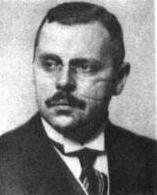Hermann Hummel
Hermann Hummel (born June 22, 1876 in Lahr / Black Forest ; † September 13, 1952 in Krefeld ) was a German chemist , educator , manager and politician ( DDP ).
Life and work
Hermann Hummel was born on June 22, 1876 in Lahr as the son of a secondary school teacher. After attending elementary school in Lahr, the higher middle school in Ettlingen and graduating from secondary school in 1894, he studied astronomy, chemistry, mathematics and philosophy at the universities in Heidelberg , Freiburg im Breisgau and Strasbourg . At the same time, he studied engineering at the Technical University of Karlsruhe and the TH Stuttgart . After the state examination for natural sciences in 1902, he worked as a chemistry teacher at a high school in Karlsruhe and also headed the chemistry laboratory there. In 1906, Hummel moved to a Karlsruhe secondary school with the same occupation. From 1912 to 1914 he worked at Electra Lackwerke GmbH. When the First World War broke out , he joined the Field Artillery Regiment No. 27 as a volunteer, with whom he took part in the fighting in France and Russia from 1915 as a reserve lieutenant until 1917 . In 1918 he was posted to the gas department of the War Ministry. Until the end of the war he worked in the inspection of the air force.
Hummel joined the administration of the Badische Aniline- und Sodafabrik in autumn 1922 , was appointed one of the directors and was a member of the company's supervisory board. He then took part in the establishment of IG Farbenindustrie AG in Frankfurt am Main , of which he has also been a member of the supervisory board since the company was founded in 1926. In addition, he was a member of the supervisory board of August Horch Automobilwerke GmbH in Zwickau and a member of the economic policy committee of the Reich Association of German Industry .
In 1930, Hummel became the sole shareholder of Imprimatur GmbH and tried to strengthen the opposition to the NSDAP through financial support from the Frankfurter Zeitung . In addition to his business activities, he was a member of the Kaiser Wilhelm Society for the Advancement of Science (from 1937 as assistant to Carl Bosch ), the Society of Friends of the Technical University of Karlsruhe and the Institute for Social Science at the Ruprecht-Karls University in Heidelberg . In 1939 he emigrated to the United States because of his Jewish descent . In 1951 he returned to Germany and settled in the Rhineland. Hermann Hummel died on September 13, 1952 in Krefeld.
Hermann Hummel was married to Emma Reis , with whom he had a son and a daughter.
Political party
Hummel joined the Baden regional association of the German People's Party , the South German Democratic Party , and was its deputy chairman from 1903. In 1910 he became a member of the Progressive People's Party through the amalgamation of the German People's Party, the Liberal People's Party and the Liberal Association . After the November Revolution he joined the DDP.
MP
Hummel was a member of the Baden state parliament from 1909 to 1918 . In 1919 he was re-elected to the Baden state parliament, to which he belonged until 1924. In the state parliament he worked as a consultant for railways and as a member of the railroad council, especially with transport issues. In the Reichstag election in December 1924 he was elected to the German Reichstag , to which he belonged until September 1930. In parliament he represented the constituency of Magdeburg .
Public offices
In 1918/19 Hummel acted as deputy to Johannes Brümmer , Baden's Minister for Military Affairs. In this function he was entrusted with the demobilization and the formation of the volunteer troops. On April 1, 1919 he was elected Minister for Culture and Education . From November 23, 1921 to November 23, 1922 he was President of the Republic of Baden . During his tenure he headed a Weimar coalition consisting of the SPD , the center and the DDP. On July 25, 1922, the new medical clinic in Heidelberg was inaugurated in his presence.
Honors
- Honorary doctorate (Dr.-Ing. E. H.) From the Technical University of Karlsruhe, 1921
See also
literature
- Robert Volz: Reich manual of the German society . The handbook of personalities in words and pictures. Volume 1: A-K. Deutscher Wirtschaftsverlag, Berlin 1930, DNB 453960286 , p. 817.
Web links
- Literature by and about Hermann Hummel in the catalog of the German National Library
- Hermann Hummel in the database of members of the Reichstag
- Short biography in the files of the Reich Chancellery
- Speeches by Hermann Hummel in the Baden state parliament in the digital collections of the Badische Landesbibliothek
| personal data | |
|---|---|
| SURNAME | Hummel, Hermann |
| BRIEF DESCRIPTION | German chemist, educator, manager and politician (DDP), Member of the Bundestag, President of the Republic of Baden |
| DATE OF BIRTH | June 22, 1876 |
| PLACE OF BIRTH | Lahr / Black Forest |
| DATE OF DEATH | September 13, 1952 |
| Place of death | Krefeld |
